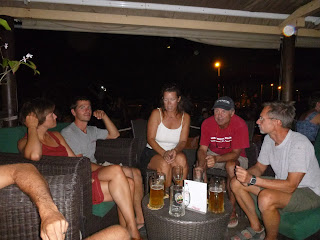 |
| Richard checking out our approach to Taha'a. |
We only spent one night in Faaroa and in the morning we
lifted our anchor and headed to Baie Hurepiti, on Taha’a…where the fun
began. When we entered the bay the wind
was ripping, gusting to over 20 knots.
We entered the bay and circled around looking for a shallow spot and had
to settle for anchoring in about 70 feet of water. We ended up setting the anchor several times
as each time the wind picked up it seemed to pull on the chain we had laid down
and swing the boat precariously close to the coral reef which was right off of
our aft quarter. With the anchor finally
set, we hunkered down for a night of gusty winds and a wildly swinging boat.
 |
| Osprey sailing off of Taha'a (photo courtesy of Kyanos). |
At some point during the night, the dinghy flipped with
the outboard attached to the transom.
When Richard peeked outside of the cabin in the morning, he noticed the
upturned dinghy and we immediately pulled the dinghy up to right it and removed
the outboard, setting it on its bracket on the stern rail. At that point, we decided to lift anchor and
proceed to the next bay up the western coast of Taha’a, Baie de Tapuamu. As we were leaving Baie Hurepiti, just at the
entrance to that bay, our anemometer recorded a wind gust of 41.6 knots. Granted, it was just a gust, but when the
gust was over we were looking at consistent winds in the mid to high 20s. We tucked into Baie de Tapuamu and were
treated to a calmer bay which was a welcomed sight after the wild night we had
just experienced. We set our anchor down
in about 80 feet of water right behind our friends on Compass Rosey and began the process of working on the outboard
motor. We changed the oil, replaced the
sparkplug and worked the water out of the inner reaches of the outboard to no
avail. It wasn’t until Mark from Compass Rosey suggested that we look at
the carburetor to see if any water had found its way in that our outboard
finally turned over. As of right now, it
works but it seems like there may be some residual moisture somewhere in the
inner workings of the motor that needs to evaporate or work its way out for the
outboard to be completely right.
Ours was not the only dinghy to flip that night in Baie
Hurepiti; Dragonsbane’s dinghy
flipped as well. As a side note, dinghy
flipping seems to be a common occurrence in the cruising community. The reason Mark knew to look at the carburetor
is because his dinghy had flipped when he was in Nuku Hiva. And just this morning we heard Nicole of Bella Star on the VHF radio saying that
their dinghy flipped last night as well.
Richard and I feel as though we are in an elite group of cruisers who
have a knowledge set that is now complete, or at least we know what to do if
our dinghy ever flips again! And while
the outboard will eventually run smoothly (or as smoothly as that sea cow will
ever run!) we will not be able to replace our dinghy oars probably until we
reach New Zealand (the oars flew out of the dinghy when it flipped, never to be
seen again…sad really).
Today Richard and I dinghied over to the Coral Gardens which is a pass between
two of the motus off the west coast of Taha’a.
The dinghy ride over was no big deal as we had the wind on our
backs. Once we got to the motu, we tied
the dinghy to a coconut tree and walked across the motu to the ocean side where
we were able to get into the water.
There was a small current passing between the motus which helped push
along the shallow pass. The fish and
coral were quite spectacular. The dinghy
ride back to the boat was a bit dicey as we were now heading into the wind and
there were wind waves impeding our progress.
We made it back to the boat and settled in for lunch.
Quite the adventure.












